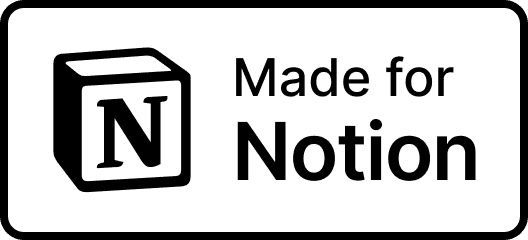Notion: The Swiss Army Knife for Product Managers


Notion: The Swiss Army Knife for Product Managers
In the fast-paced world of product management, juggling multiple responsibilities, tracking ideas, and collaborating across teams can feel like a constant balancing act. This is where Notion shines—acting as a versatile, all-in-one workspace that empowers product managers to streamline workflows, centralize information, and ultimately build better products.
If you’re a product manager feeling overwhelmed by scattered resources, struggling to prioritize tasks, or seeking a more efficient way to manage your product development process, Notion has you covered. Whether you’re a seasoned pro or just beginning your journey, this comprehensive guide will show you how to use Notion to supercharge productivity and achieve your product goals.
Building Your Product Management Hub in Notion
To harness Notion’s power, start by creating a dedicated product management workspace. This central hub will house all your essential information—from high-level product strategy to detailed tasks—ensuring that everyone on your team is on the same page.
Centralizing Resources
Master Product Workspace: Start with a master page to serve as your home base. This is your starting point for everything product-related.
Clear Hierarchy: Organize your workspace with a logical structure of pages and subpages, perhaps by product area, development stage, or team resources.
Linked Databases: Use Notion’s powerful database functionality to create linked databases for tasks, ideas, user stories, and more. This setup lets you track relationships and dependencies between information effortlessly.
External Integrations: Integrate Notion with other essential tools, like Google Drive, Figma, or your project management software, so all relevant resources are accessible in one place.
Organizing Your Workspace for Maximum Efficiency
To maximize productivity, structure your workspace in ways that make it easy to find and focus on relevant information.
Page Properties and Filters: Use Notion’s page properties (like status, priority, and assignee) and apply filters to create customized views of your data. This way, you can zero in on the most relevant information.
Templates: Save time and ensure consistency by creating templates for recurring tasks, such as user story creation, sprint planning, or product launch checklists.
Tagging System: Implement a tagging system to categorize information and make it easily searchable. Use tags for product features, customer segments, or project phases to quickly locate relevant content.
Mastering the Product Development Process in Notion
Notion’s versatility supports every stage of the product development process, from early ideation to post-launch iteration.
Ideation and Discovery
Brainstorming: Use Notion’s real-time editing and comments to brainstorm ideas with your team and capture insights in a collaborative space.
User Feedback: Create a dedicated feedback database to capture and organize user input, helping you identify patterns and prioritize feature requests.
Product Roadmaps: Visualize your product roadmap in Notion using timelines, milestones, and linked databases to track progress and dependencies at a glance.
Planning and Execution
Task Management: Break down projects into actionable tasks, assign them to team members, and use Notion’s Kanban boards or lists to track progress and workflows visually.
Sprint Planning: Plan and track sprints with templates and customizable views, helping you stay on top of deadlines and deliverables.
Collaboration: Collaborate in real-time with comments, @mentions, and shared workspaces, keeping everyone aligned and informed.
Launch and Iteration
Launch Plans: Create detailed launch plans outlining key milestones, timelines, and responsibilities to ensure a smooth rollout.
Post-Launch Feedback: Use Notion to collect and analyze feedback through surveys, polls, or customer interviews, ensuring your team can quickly adapt and iterate.
Data Analysis: Use Notion’s built-in reporting tools to track product usage, engagement, and customer satisfaction, providing valuable insights for future product improvements.
Conclusion: Notion as Your Product Management Powerhouse
Notion acts as a comprehensive tool that streamlines every aspect of product management—from ideation and planning to execution and analysis. With a well-organized Notion workspace, product managers can centralize resources, collaborate effectively, and ensure alignment across teams. Embrace Notion’s flexible features to build a scalable, efficient product management system that grows with your team’s needs and helps you deliver products that make an impact.
Learn more about product management techniques and frameworks from our previous publications at belowtion:
